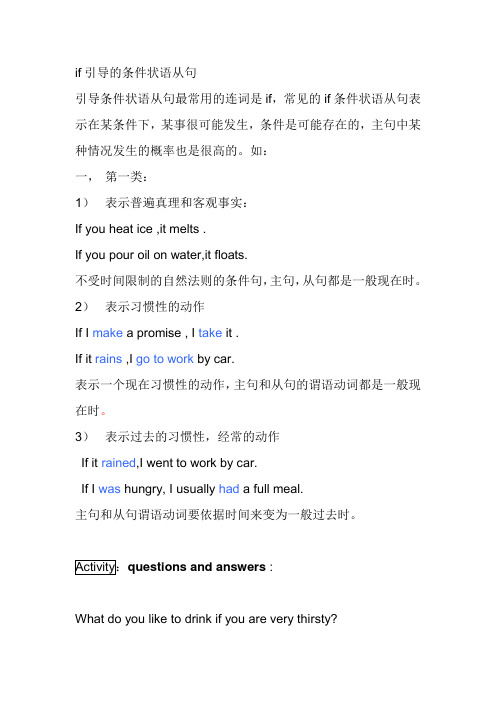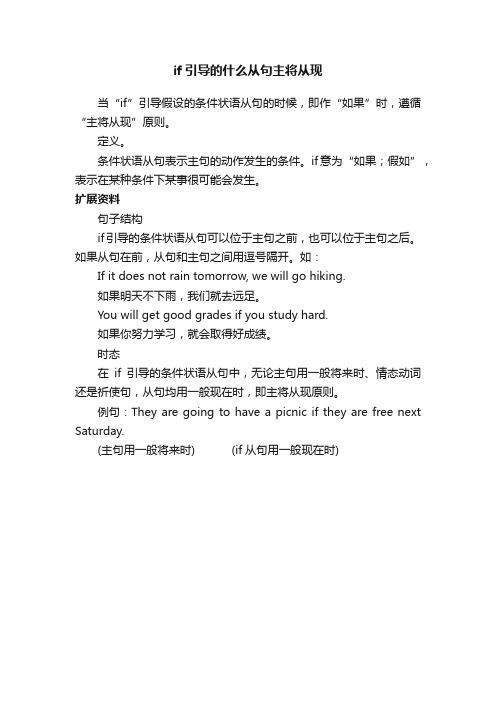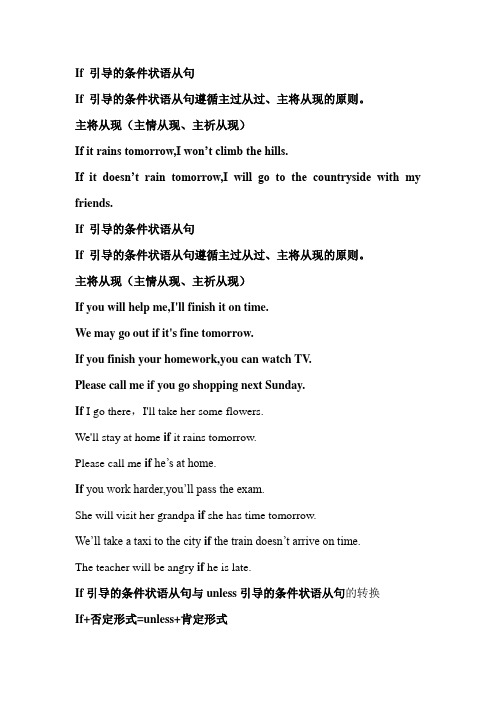if条件句子分析
if 条件状语从句

if引导的条件状语从句引导条件状语从句最常用的连词是if,常见的if条件状语从句表示在某条件下,某事很可能发生,条件是可能存在的,主句中某种情况发生的概率也是很高的。
如:一,第一类:1)表示普遍真理和客观事实:If you heat ice ,it melts .If you pour oil on water,it floats.不受时间限制的自然法则的条件句,主句,从句都是一般现在时。
2)表示习惯性的动作If I make a promise , I take it .If it rains ,I go to work by car.表示一个现在习惯性的动作,主句和从句的谓语动词都是一般现在时。
3)表示过去的习惯性,经常的动作If it rained,I went to work by car.If I was hungry, I usually had a full meal.主句和从句谓语动词要依据时间来变为一般过去时。
questions and answers :What do you like to drink if you are very thirsty?How many days are there in February it it is a leap year ? Who do people go and see if they get ill ?第二类:If we catch the 10 o’clock train ,we shall (will ,can,may,must ,should ) get there in time .If it is fine tomorrow ,we can have a picnic somewhere.If you wake up before me , give me a call .条件句(从句)用一般现在表示将来,主句用shall 加动词原型或者是祈使句在if 引导的条件状语从句中,如果从句谈论的是一个有可能发生的事实及其产生的相关的结果,主句用一般将来时态,从句用一般现在时态。
if条件状语从句语法

当句末为or not时,引导词只能用whether而不能用if.
第6页
If 与whether 区分
1. I don’t know _____ he will come or not. 与or not 连用只能用whether
2. I don’t care of ______ he is handsome. 介词后只能用whether
3 If she__w__in_s___ (win) the prize ,we _w_i_ll_b__e_(be) happy. 4.If I __d_o_n_’__t _e_at (not,eat )so much ,I _w__il_l _g_e_t__(get) thinner.
5.If you __te_l_l __(tell) them, they __w_o_n_’__t__b_e_li_e_ve(not,believe) you. 6 I __w_i_ll_s_t_a_y_(stay) at home,If it ___ra_i_n_s____( rain). 7.If it _d__o_e_s_n_’__t ___(not,rain) ,I __w__il_l _g_o__( go) out.
5. 以下从句中will不是未来时助动词,而是情态动词。 翻译为“愿意”。
If you will excuse me,I really must go to bed . 假如你能原谅我话,我真要睡觉了。
If you will wait a minute ,I’ll go and tell my mother that you are here .
If you are free this weekend, what will you do ?
if引导的什么从句主将从现

if引导的什么从句主将从现
当“if”引导假设的条件状语从句的时候,即作“如果”时,遵循“主将从现”原则。
定义。
条件状语从句表示主句的动作发生的条件。
if意为“如果;假如”,表示在某种条件下某事很可能会发生。
扩展资料
句子结构
if引导的条件状语从句可以位于主句之前,也可以位于主句之后。
如果从句在前,从句和主句之间用逗号隔开。
如:
If it does not rain tomorrow, we will go hiking.
如果明天不下雨,我们就去远足。
You will get good grades if you study hard.
如果你努力学习,就会取得好成绩。
时态
在if引导的条件状语从句中,无论主句用一般将来时、情态动词还是祈使句,从句均用一般现在时,即主将从现原则。
例句:They are going to have a picnic if they are free next Saturday.
(主句用一般将来时) (if从句用一般现在时)。
If-引导的条件状语从句

If 引导的条件状语从句If 引导的条件状语从句遵循主过从过、主将从现的原则。
主将从现(主情从现、主祈从现)If it rains tomorrow,I won’t climb the hills.If it doesn’t rain tomorrow,I will go to the countryside with my friends.If 引导的条件状语从句If 引导的条件状语从句遵循主过从过、主将从现的原则。
主将从现(主情从现、主祈从现)If you will help me,I'll finish it on time.We may go out if it's fine tomorrow.If you finish your homework,you can watch TV.Please call me if you go shopping next Sunday.If I go there,I'll take her some flowers.We'll stay at home if it rains tomorrow.Please call me if he’s at home.If you work harder,you’ll pass the exam.She will visit her grandpa if she has time tomorrow.We’ll take a taxi to the city if the train doesn’t arrive on time.The teacher will be angry if he is late.If引导的条件状语从句与unless引导的条件状语从句的转换If+否定形式=unless+肯定形式You won’t pass the exam if you don’t work hard.=You won’t pass the exam unless you work hard.If you don’t go to bed earlier,you will feel tired in the morning. =Unless you go to bed earlier,you will feel tired in the morning. If it doesn’t rain,he will play with me tomorrow.=Unless it rains,he will play with me tomorrow.If she doesn’t come,I’ll go shopping alone=Unless she comes,I’ll go shopping alone.if条件状语从句与祈使句,and/or+一般将来时的句子转化If you get up early,you’ll get there on time.=Get up early,and you’ll get there on time.=Get up early,or you won’t get there on time.If you get up early,you won't be late for school.=Get up early,and you won't be late for school.=Get up early,or you will be late for school.If you don’t get up early,you won’t catch up with the early bus. =Get up early,and you will catch up with the early bus.=Get up early,or you won’t catch up with the early bus.if条件状语从句与without的句子转化If there is no water,we can't live.=We can't live without water.If there is no water,fish will die.=Fish will die without water.If you help me,I’l l finish the work soon.=With your help,I finish the work soon.if条件状语从句与祈使句,and/or+一般将来时的句子转化If you get up early,you’ll get there on time.=Get up early,and you’ll get there on time.=Get up early,or you won’t get there on time.If you get up early,you won't be late for school.=Get up early,and you won't be late for school.=Get up early,or you will be late for school.If you don’t get up early,you won’t catch up with the early bus.=Get up early,and you will catch up with the early bus.=Get up early,or you won’t catch up with the early bus.1. your friend ,I'll tell you.eB.will comeesD.are coming2. If you go to college,you a good education.A.will getB.getC.getsD.got3.I want to know if they tomorrow.eB.will come C comes D.came4.Take enough exercise, you'll be in good heath.A.orB.soC.butD.and5.If it (not rain),he (play)basketball withme tomorrow.6.If Uncle Lan ______(come),I______(call)you up.7.She must see a dentist if she______(have)a toothache.8.Please wake me up if he______(come)back.9.Hurry up!Or you ______(be)late again.10.If you don’t be quick,you(be)late.1.We won’t wait for you you can’t arrive on time.A.untilB.whenC.afterD.if2.The children will go to the zoo if it (not rain)this Saturday.3.If she work hard,she be able to go to colleage.A.not,notB.won’t,won’tC.won’t,doesn’tD.dpesn’t,won’t4.If I run every day,I (be)healthier.5.If it (not rain),he (play)with me tomorrow.6.She must see a dentist if she (have)a toothache.7.Study hard,or you (not pass)the test.8.If you (not go)to bed earlier,you will feel tired in the morning.9.If he (be)free tomorrow,he will come to your birthday party.10.We will go to the zoo if it (not snow)tomorrow.。
if从句的三种时态用法

千里之行,始于足下。
if从句的三种时态用法if 从句是条件从句,用来表达假设、条件或可能性。
在 if 从句中,有三种时态用法:一般现在时、一般过去时和将来时。
下面将具体解释这三种时态的用法。
一、一般现在时:一般现在时在 if 从句中表示真实条件或经常性的状况。
当 if 从句使用一般现在时时,主句的谓语动词使用一般现在时、一般将来时或其他适当的时态。
1. 真实条件:将来可能或经常发生的条件。
例如:- If it rains, we will stay at home.(假如下雨,我们会呆在家里。
)- If I go to the supermarket, I buy some food.(假如我去超市,我会买些食物。
)2. 常事情、普遍真理或口头习惯。
例如:- If you heat water to 100 degrees Celsius, it boils.(假如你把水加热到100摄氏度,它会煮开。
)- If it is Sunday, I usually go for a long walk.(假如是星期天,我通常会去散长长的步。
)3. 当 if 从句和主句不同时,主句表示客观事实或普遍真理。
例如:- If I have time, I read books.(假如我有时间,我会读书。
)第1页/共3页锲而不舍,金石可镂。
- If he studies hard, he gets good grades.(假如他努力学习,他会取得好成果。
)二、一般过去时:一般过去时在 if 从句中表示与现在相反的状况、假设或不太可能发生的状况。
在这种状况下,主句的谓语动词使用过去将来时、过去完成时、情态动词 could 或其他适当的时态。
1. 与现在相反的状况。
例如:- If I were you, I would apologize.(假如换成是我,我会赔礼。
)- If she had time, she would visit her grandmother.(假如她有时间,她会去看她的奶奶。
if条件状语从句的用法_If引导的条件状语从句

if条件状语从句的用法_If引导的条件状语从句很多英语学习者都觉得If引导的条件状语从句这个句型很难,学习起来很吃力。
下面是小编为你整理的If引导的条件状语从句的相关资料,希望大家喜欢!If引导的条件状语从句用法1.if引导的条件状语从句可以放在主句之前,也可以放在主句之后,如果放在主句之前,中间要用逗号将主句和从句隔开。
例如:If I am free, I will come to see you.= I will come to see you if I am free.如果我有空,我就来看你。
2. 在含if引导的条件状语从句的复合句中,主句用一般将来时,从句通常用一般现在时态表示将来意义,即主将从现原则。
例如:If it snows tomorrow, we will go skiing.如果明天下雪,我们就去滑雪。
3. 在含if引导的条件状语从句的复合句中,语句的谓语还可含有情态动词can、must、may等,主句也可是祈使句。
例如:If it stops raining, we can go out.如果雨停了,我们就能出去。
4. 在含if引导的条件状语从句的复合句中,如果主句部分描述的是客观事实或真理,要用一般现在时。
例如:If you heat the ice, it turns into water.如果你加热冰,它就会变成水。
if引导的非真实条件句对过去的虚拟条件从句(if):主语+had done 主句might/would/should/could+have done 对现在的虚拟if+ 主语+动词过去式(be用were)主句might/would/should/could+do对将来的虚拟if+主语+动词过去式(be用were)或主语+should do或主语+were to do主句might/would/should/could+doe.g.Tom got to the station in time because he started earlier.If Tom had started late, he would have missed the train.Do you think the thief entered through the door?No, if he had, I don't believe, he would have broken the living room window.If the book weren't so expensive, I would buy it.If you didn't live so far away, we would be able to visit you more.What would you do if you lost your passport in a foreign country?Why hasn't he come? If he should not come on time, we would have to put off the trip.2.注意事项e.g.If she hadn't work hard at English in the past, she wouldn't work as well as a secretary in a large company now. 混合时间的虚拟语气从句为对过去的虚拟,主句是现在。
if条件状语从句主将从现
if条件状语从句主将从现
if引导的条件状语从句主将从现。
条件状语从句表示主句的动作发生的条件。
if 意为“如果;假如”,表示在某种条件下某事很可能会发生。
在if的条件状语从句中,主句为下列情形之一时,if条件状语要用一般现在时。
1.主句是一般将来时(主将从现)
例如:If he comes, he will tell me all.如果他来了,他会告诉我所有(的事情)。
2.主句是含有情态动词may/might/can/must/should等句子。
例如:If you want to lose weight, you must eat less bread.如果你想减肥,你必须少吃面包。
(主句中含有情态动词must,所以if引导的条件状语从句要用一般现在时态。
)
3.主句是祈使句
例如:If you are not strong enough, please don't take part in such an activity.如果你不够强壮,请不要参加这种活动。
(主句是一个Do型的祈使句,所以根据原则,if从句要用一般现在时态。
——不清楚Do型祈使句的小伙伴可以查看冉老师历史发文记录)。
if引导的条件状语从句总结+习题
if引导的条件状语从句[课本链接]If you do, you’ll be sorry. (Unit 5, Section A)[定义] :if引导的条件状语从句表示假如从句的动作发生,主句的动作就(不)会发生。
[句子结构]if 引导的条件状语从句位置灵活,可直接放在主句后面,也可以放在句首。
放在句首时,从句后面要用逗号和主句隔开。
如:I’ll go to see you if I have time. 如果有时间,我就去看你。
If it rains tomorrow, we’ll sta y at home. 如果明天下雨,我们就呆在家里。
[时态呼应]在复合句中:⑴ 当主句是一般现在时或是一般将来时时;(2)当主句是祈使句时;(3)当主句含有情态动词时,if引导的条件状语从句通常用一般现在时。
如:If she doesn’t come, she will be sorry. 如果她不来,她会遗憾的。
Have a good rest if you are tired. 如果累了,你就好好休息一下。
We must study hard if we want to pass the final exam. 如果想通过期末考试,我们必须努力学习。
[同义句转换]1. 用“祈使句+ and / or +一般将来时的句子”转换。
如:If you work hard, you’ll pass the exam easily. → Work hard, and you’ll pass the exam easily. 努力学习,你将很容易通过考试。
If you don’t hurry up, you’ll miss the train. → Hurry up, or you’ll miss the train. 快点儿,否则你就赶不上火车了。
2. 用含介词with或without的介词短语转换。
如:If there is no water, fish can’t live. → Fish can’t live without water. 离开水,鱼不能生存。
if引导的条件状语从句讲解
条件状语从句在句子中做条件状语的从句称为条件状语从句。
通常置于句首或句尾。
一.条件状语从句通常由if(), unless(),as long as()引导。
例如If we pay much attention to the earth, we'll have a better world.如果我们多关爱地球,就会拥有一个更美好的世界If it rains tomorrow, what shall we do?如果明天下雨,我们怎么办?尝试一下:(补全句子)If it rains tomorrow, we won’t go to the park.______________________________________。
Unless weather stops me, I go for a walk every. 我每天都会去散步,除非遇上坏天气。
只要我们竭尽全力,父母就会满意我们的表现。
Our parents will be pleased with our performance _____ _____ ______ we try our best.二、if引导的条件状语从句(1)“if从句+祈使句”的句子。
其实,if作为一个连词,主句也可以是其他形式的句子。
例如:If you want to go, please let me know.If the green light isn’t on, wait for a minute.}()(2)“祈使句+ and (or)+ 陈述句” 在意思上相当于一个带有条件状语从句的复合句。
注意:A. “祈使句+ and + 陈述句”可以转化为if引导的肯定条件状语从句,而且主语是第二人称。
B. “祈使句+ or + 陈述句”可以转化为if引导的否定条件状语从句,而且主语是第二人称。
例如:Study hard and you will pass the exam. =_________________________________________.Hurry up, or you’ll be late. =__________________________________________________..考题(2010重庆中考)Work hard,________ you may catch up with your classmates soon.A.orB.butC.andD.yet黑色陷阱:本题的陷阱是句型,本句型区别于“祈使句+or”,这个句型的含义是“……,不然的话/否则……”。
if引导的条件状语从句(讲义及解析)
if引导的条件状语从句(讲义及解析)状语用来表示行为发生的时刻、地点、目的、方式、程度等,通常由副词或介词短语充当,也可由一个句子充当。
I slept at home yesterday because I had a bad cold.状语从句状语从句指句子作状语。
依照其作用可分为时刻、地点、缘故、条件、目的、结果、让步、方式等从句。
状语从句一样由连词(从属连词)引导。
I will go to school by bike tomorrow if it is sunny.Grammar focus—I think I’ll take the bus to the party.—If you do, you’ll be late.If you take the bus to the party, you’ll be late.—I think I’ll stay at home.—If you do, you’ll be sorry.If you stay at home, you’ll be sorry.—What will happen if they have the party today?—If they have it today, half the class won’t come.—Should we ask people to bring food?—If we ask people to bring food, they’ll just bring potato chips and chocol ate.if 在本单元句中意为“;”,用于引导即 if 引导的是一个完整的句子,因此一定要有主谓,成为从句,另一个句子则成为主句。
If you go there, I’ll go, too.We will go hiking if it doesn’t rain tomorrow.If Bob leaves tomorrow, I will hold a party for him tonight.if 引导的条件状语从句既能够放在主句前,也可放在主句后。
- 1、下载文档前请自行甄别文档内容的完整性,平台不提供额外的编辑、内容补充、找答案等附加服务。
- 2、"仅部分预览"的文档,不可在线预览部分如存在完整性等问题,可反馈申请退款(可完整预览的文档不适用该条件!)。
- 3、如文档侵犯您的权益,请联系客服反馈,我们会尽快为您处理(人工客服工作时间:9:00-18:30)。
做题方法:1.判断是不是谓语,是的话,注意时态。 2.固定词组搭配
If 引导的条件句 意思: 时态: 2. 句子结构之; 主谓 主谓宾 主谓双宾 主谓宾宾补 主系表 3. 心脏原理
1.
( )8.My parents are very happy to make __________money. A. a lot B. a lot of C. many D. little ( )9. She became the champion of 2006 Super Voice Girl and people are watching her ____. A. at a time B. for the first time C. on time D. all the time ( )10. Can you remind me how ______ to your house? A. get B .can go C. will get D. to get ( )11. I decide ______ I won’t go to school today. A. where B. that C. when D. who
48. He always _____________ (shout) at others. That is not good. 49. _____________ (not bring) friends from other class. 50. Do you have a difficult time ______________(work) out these math problems?. 51. I’m sorry I have no time _____________ (watch) TV now. 52. Her mother asks her not to play computer games too much. If she _________ (do), her mother will be mad at her. 53. I am ______________ (leave) for Washington next Sunday. 54. I am learning how_______(swim). 55. Don't forget _________ (take ) away what you bring there.
( )12. Australia is famous _________sheep and kangaroos. A. at B. on C. for D. with ( )13. The boy made a hole in the door to let his cat______. A. in B. out of C. to come in D. to go out ( )14. If you get up ___ tomorrow, how can you finish ____ the book? A. late, to read B. lately, to read C. late, reading D. lately, reading ( )15. ______ the dirty glasses away and ______the clean ones for me. A. Take; take B. Bring; bring C. Take; bring D. Bring; take
自我评估
你心中的“英语大怪兽”有哪些特点? A、词汇(记忆、辨析) B、语法(会用吗?) C、阅读(单词不认识,阅读速度慢,时间不 够?) D、选词填空 E、完形填空 F、听力
G 写作
If 引导的条件句分析
( )1. We’ll go to the Summer Palace _____ it doesn’t rain this Saturday. A. when B. if C. until D. because
I will be late for school. I don’t finish my homework.
The teacher will be angry with me.
主语 I I He We
谓语 teach will play has exercise
宾语 状语 English. soccer tomorrow. a toothache. every day.
1.If 表示 如果 2. 词组要想正确 3.注意时态用正确
(
)1. We’ll go to the Summer Palace _____ it doesn’t rain this Saturday. A. when B. if C. until D. because ( )2.Many professional athletes ______ in matches. A. have injured B. get injured C. are injuring D. be injured ( )3. We need not these flowers anymore, please ________. A. take away them B. take them off C. take them away D. take it away ( )4. If you ______ have ID card,they ______ let you in. A. do;won’t B. will;will C. don’t;won’t D .do;will ( )5.He made a living ______ doing some important things. A. with B. in C. to D. by
主语 系动词 I am They are The leaves are The leaves turn
表语 angry. students. yellow. green.
老师语录:心脏原理。 一个人只有一个心脏,一个句子也只有 一个心脏那就是谓语。如果有两个心脏, 那么一定会有一个连接词。 If I don’t get enough exercise, I will get fat. I will not get any friends if I don’t help others.
We’ll go to the Summer Palace,if it doesn’t rain this Saturday.
句子拆解: 1 2
1.
如果我明天起晚了,我就会迟到。
2.
如果我不完成作业,老师就会生我的气。
3.
如果年轻人太晚不回家,家长们就会担心。
句子结构分析 I get up late.
